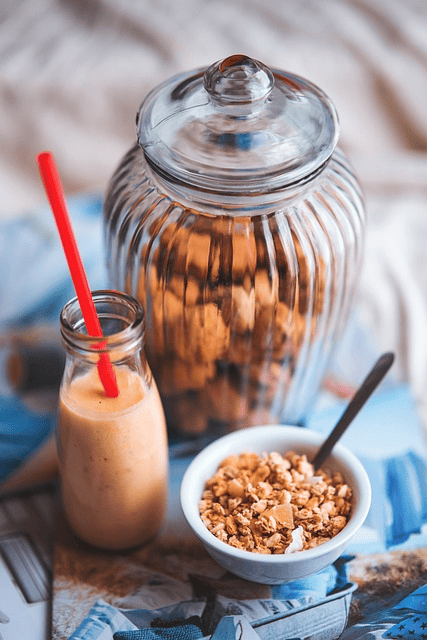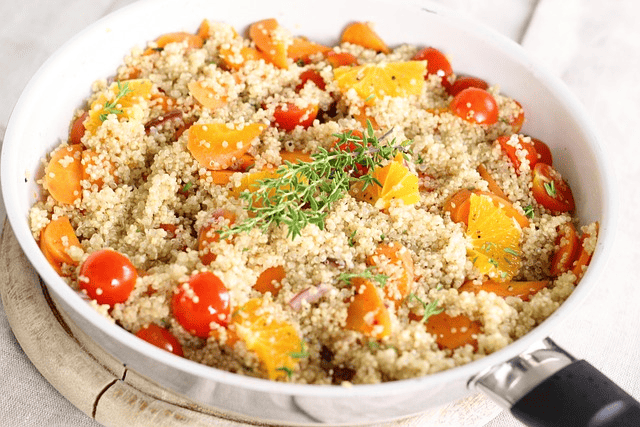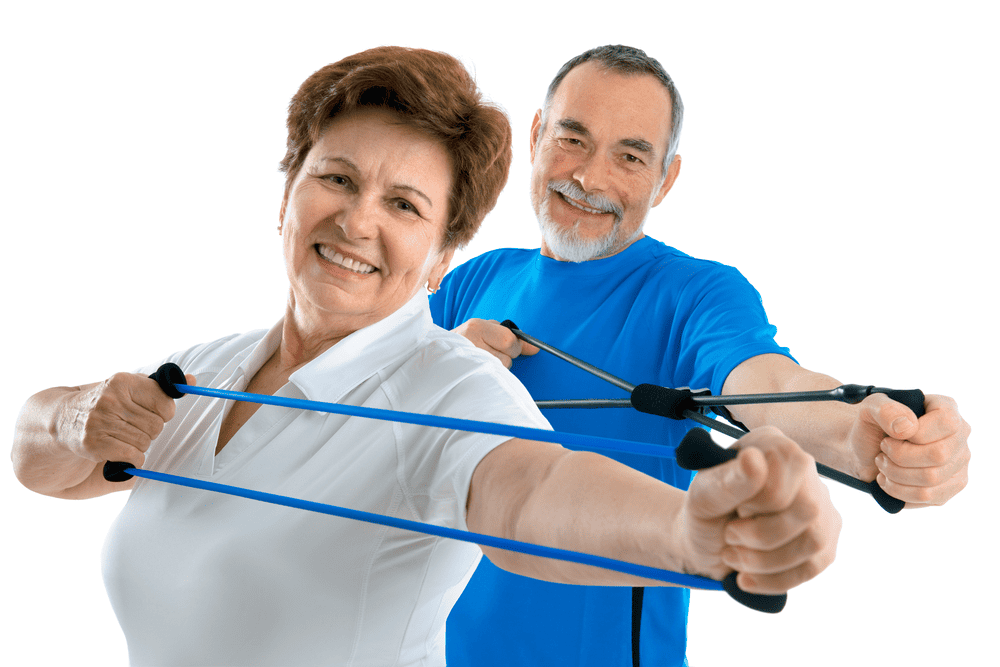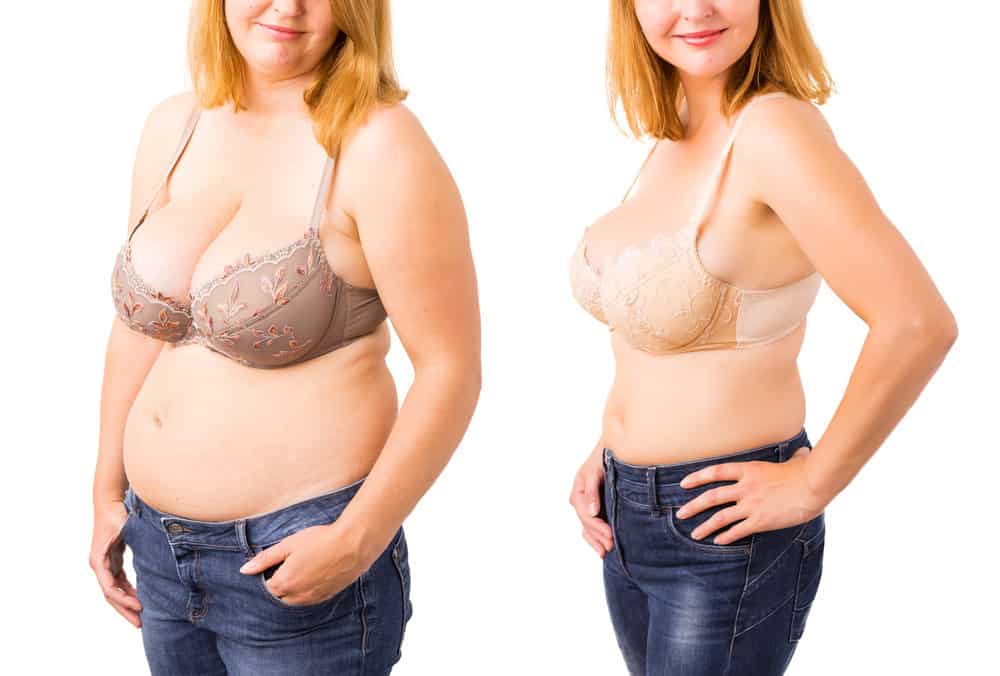Ever wondered what the best diet to lose fat and gain muscle is? Get ready to discover a comprehensive guide that will provide you with everything you need to know to achieve your body composition goals with the Best Diet to Lose Fat and Gain Muscle. Let’s dive in!
Key Takeaways
-
Fuel your body with the right macronutrients for fat loss and muscle gain.
-
Incorporate top foods such as lean proteins, complex carbs, healthy fats into your diet.
-
Monitor progress and adjust routine to reach success in fat loss & muscle gain journey!
The Importance of Macronutrients

Achieving your body composition goals requires a solid understanding of the role protein, carbohydrates, and fats play in losing fat and gaining muscle. These essential macronutrients work together to fuel your body, support muscle growth, and help you shed body fat.
Protein
Protein is a key component for achieving both fat loss and muscle gain. Incorporating higher protein diets in combination with resistance exercise can help to maximize muscle mass and strength. To get the most out of your muscle-building efforts, aim for 1.4-2 grams of protein per kilogram of body weight per day.
A healthy diet includes a variety of protein-rich foods, including:
-
Meat
-
Fish
-
Eggs
-
Plant-based options
Consuming enough protein while maintaining a calorie deficit can help you lose weight and gain muscle.
Some other nutrients that can aid muscle gain include B vitamins, leucine, and creatine, which can be found in red meat.
Carbohydrates

Your workouts and daily activities draw energy from carbohydrates. Eating wholesome sources of carbohydrates can help you achieve your fat loss and muscle gain goals. Some examples of wholesome sources of carbohydrates include:
-
Brown rice
-
Quinoa
-
Fruits
-
Vegetables
-
Whole grains
Consuming larger portions of carbs before and after workouts can maximize your workout performance.
Slow-burn carbs, which occur only in plant foods, can provide your body with sustained energy for longer periods of time. Some examples of nutritious and energizing carb sources include:
-
Cooked brown rice, which contains an impressive 6 grams of protein per cup
-
Quinoa, which is a complete protein and also rich in fiber
-
Sweet potatoes, which are packed with vitamins and minerals
-
Oats, which are high in fiber and can help regulate blood sugar levels
Including these carb sources in your diet can fuel your workouts and support your muscle-building efforts.
Fats
For overall health and hormone production, your diet should include moderate amounts of healthy fats. Fats can provide you with energy, regulate hormones, and help you absorb certain vitamins and minerals, all of which can aid in fat loss, muscle gain, and overall weight loss. Incorporating these healthy fats into your diet can also help you burn fat more effectively. Some delicious sources of healthy fats include:
-
Avocado
-
Nuts
-
Oily fish
-
Egg yolks
-
Grass-fed beef
-
Pork
-
Organ meats
Almonds, for example, are an excellent source of protein, vitamin E, magnesium, and phosphorus. Consuming half a cup of blanched almonds in moderation provides you with plenty of nourishment and health benefits. Chia seeds are another incredibly nutritious seed, packed with protein and omega-3 fatty acids. Including these healthy fats in your diet can support your fat loss and muscle gain goals.
Top Foods for Fat Loss and Muscle Gain

Find out which foods best promote fat loss and muscle growth, such as lean proteins, complex carbs, and healthy fats. Some fantastic vegan and vegetarian options to help you reach your fat loss and muscle gain goals include tofu, quinoa, tempeh, seitan, eggs, dairy products, pulses, legumes, whole grains, nuts and seeds, leafy greens, peas, spinach, kale, broccoli, seitan, and quinoa.
Incorporate lean meats like beef, turkey, and chicken, as well as seafood options like scallops, shrimp, and tilapia, to get the protein you need to reach your goals. Beans and legumes are also excellent sources of fiber and B vitamins, which are essential for lean muscle gain. Prioritize these top foods in your diet to support your fat loss and muscle gain efforts.
Meal Planning and Portion Control

Develop a meal plan with the right calorie and macronutrient amounts for muscle gain and fat loss to help your body reach its full potential and optimal performance. Nutrition apps can be a great tool to help you keep track of your daily protein intake and stay on track with your muscle-building goals.
Aim for a caloric deficit of no more than 300 calories for a successful weight loss journey, and a recommended rate of weight loss of 0.5-1.0 pounds per week. This gradual approach to weight loss, combined with a balanced meal plan and portion control, will help you achieve your fat loss and muscle gain goals.
The Role of Resistance Training

Your body benefits immensely from strength training. Resistance training can help you reach your goals by stimulating muscle growth and improving insulin sensitivity, which helps your body pull from its fat stores to fuel itself and build muscle.
Incorporate weight lifting into your fitness routine at least twice a week or every other day, paying attention to your form and technique when lifting weights. Mix it up by lifting lighter weights for lots of reps or heavier weights with fewer reps. For more guidance, join a community or seek professional advice to get a personalized strength training plan.
Cardiovascular Exercise and Fat Loss

Cardiovascular exercise not only helps burn calories and improve heart health, but also boosts endurance and leaves you feeling great. Finding a balance between cardiovascular exercise and resistance training is essential.
Here are some benefits of cardiovascular exercise:
-
Burns calories
-
Improves heart health
-
Boosts endurance
-
Releases endorphins, leaving you feeling great
On the other hand, resistance training can help you build muscle and increase strength.
By incorporating both types of exercise into your routine, you can achieve a well-rounded fitness regimen.
Some of the best cardiovascular exercises for fat loss and muscle gain include:
-
Sprinting
-
Hill running
-
Fireman’s carry
-
Dumbbell clean and jerk
-
HIIT routines that incorporate weights
Incorporating these exercises into your fitness routine can help you achieve a perfect balance between cardiovascular exercise and resistance training for optimal results.
Supplementation for Fat Loss and Muscle Gain

Supplements can effectively support your fat loss and muscle gain efforts, helping you reach your goals more quickly. Some great supplements to help you reach your fat loss and muscle gain objectives include:
-
Protein powders
-
Creatine
-
Caffeine
-
Thermogenics
Using supplements alongside a nutritious diet and regular exercise can help to maximize their effectiveness. Remember to take them at the right times and in the right amounts for the best results. For example, the Burn Pre-Workout Powder can be taken before workouts to boost your energy levels and target fat loss.
Monitoring Progress and Adjusting Your Diet

To see if your hard work is paying off, it’s important to track changes in your body composition. Taking progress pictures every four to six weeks, alongside weighing yourself, provides a more comprehensive view of your body composition progress.
Keeping notes and records can help identify areas that need adjustment to ensure progress in body composition goals. By monitoring your progress and making necessary adjustments to your diet and exercise routine, you can achieve continued success in your fat loss and muscle gain journey, as well as effectively lose body fat.
Special Considerations: Vegan and Vegetarian Diets

Vegan and vegetarian diets, which exclude or limit the consumption of animal products, are wholesome and plant-based. Optimizing fat loss and muscle gain on plant-based diets is possible by focusing on the best protein sources for vegans and vegetarians.
Some of the best vegan and vegetarian protein sources include:
-
Tofu
-
Quinoa
-
Tempeh
-
Seitan
-
Eggs
-
Dairy products
-
Pulses
-
Legumes
-
Whole grains
-
Nuts and seeds
-
Leafy greens
-
Peas
-
Spinach
-
Kale
-
Broccoli
Including these nutrient-dense foods in your plant-based diet can support your fat loss and muscle gain goals.
Common Mistakes to Avoid
Identifying and avoiding common pitfalls in your pursuit of fat loss and muscle gain is key to long-term success. Some strategies to maximize success in losing fat and gaining muscle include:
-
Focusing on progress rather than the scale
-
Eating the right amount of calories
-
Creating a balanced workout plan for building muscle
-
Consuming adequate protein
-
Taking a gradual approach to weight loss
Not avoiding these mistakes can lead to:
-
Muscle loss
-
Weight gain
-
Nutrient deficiencies
-
Frustration
-
Lack of motivation
These factors can make it hard to stay on track with a diet and exercise plan. By focusing on the quality of your diet and exercise plan, setting realistic goals, tracking your progress, and seeking professional advice if needed, you can avoid these common mistakes and achieve lasting success in your journey to lose fat, as well as experience muscle gain and fat loss.
Summary
In conclusion, the best diet to lose fat and gain muscle is one that incorporates the right balance of macronutrients, prioritizes whole foods, and is combined with a consistent workout routine that includes both resistance training and cardiovascular exercise. By monitoring your progress, making necessary adjustments, and avoiding common mistakes, you can achieve your body composition goals and enjoy lasting success. Stay committed, stay focused, and always remember that consistency is key!
Frequently Asked Questions
What should I eat to lose fat and gain muscle?
Eat lean proteins like chicken, turkey, fish, tofu, eggs, salmon, Greek yogurt, and edamame to lose fat and gain muscle.
Can you lose fat and gain muscle at the same time?
Yes, you can lose fat and gain muscle at the same time! As long as you prioritize strength training exercises with big multi-joint movements, anchor it with a plan optimized for your body’s needs and sustain a lifting program while maintaining a caloric deficit, you’ll be able to fuel yourself and potentially build muscle mass. Make sure to include plenty of protein in your diet too!
What is the fastest way to lose fat and gain muscle?
For the most efficient results, combine cardio with weight training, decrease overall calorie consumption and increase protein intake to maximize fat loss and muscle building.
What should I eat to lose muscle and fat?
To lose muscle and fat, focus on a diet high in fiber-filled veggies, healthy proteins, and good carbs. Get your nutrients from lean meats, fish, poultry, eggs, nuts, beans, whole grains, and low-fat dairy products while minimizing added sugars, salt, cholesterol, saturated fats, and trans fats.
How much protein should I consume daily to support muscle gain?
Aim for 1.4-2g of protein per kg of body weight daily to maximize muscle growth and repair.
